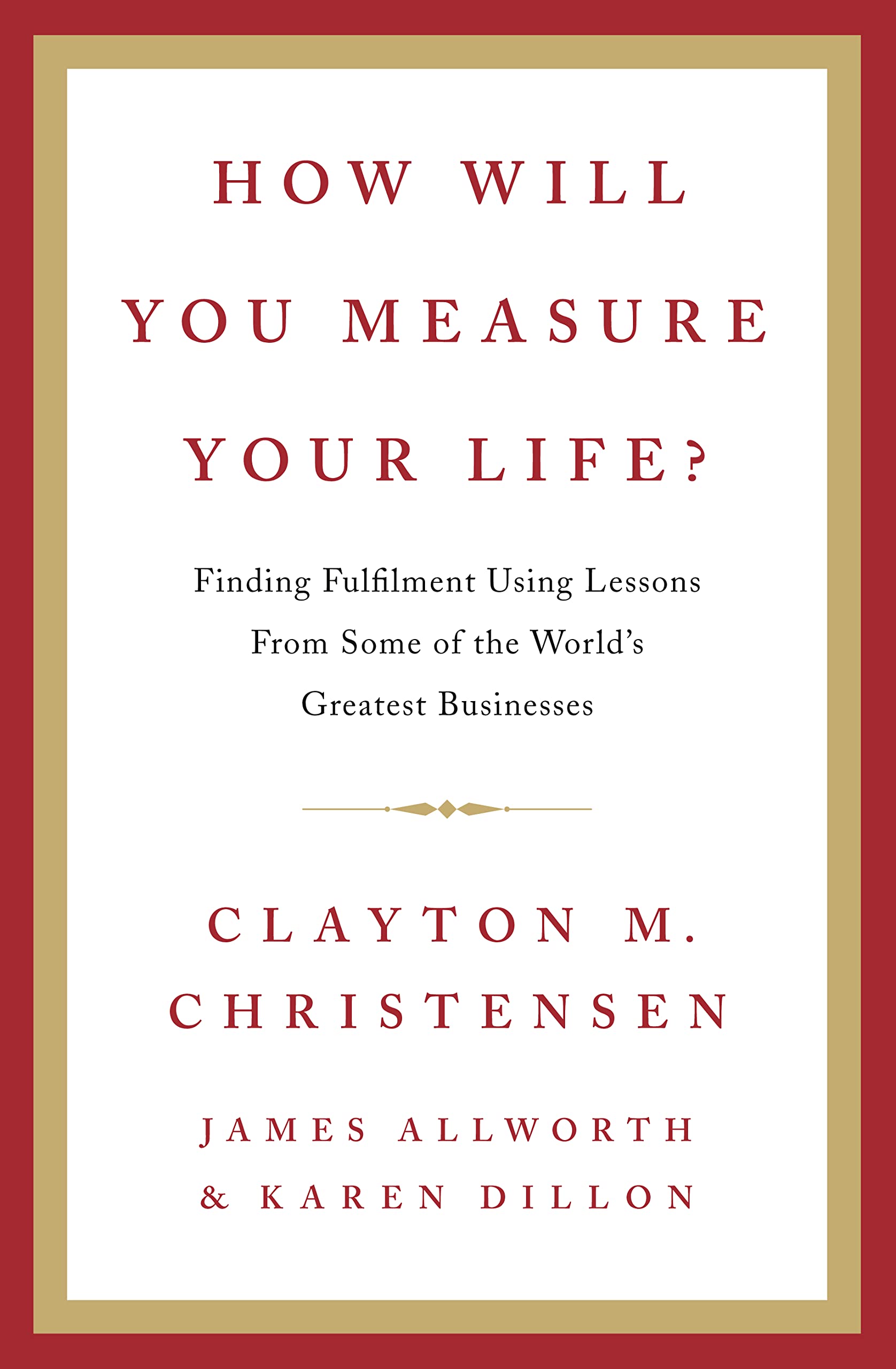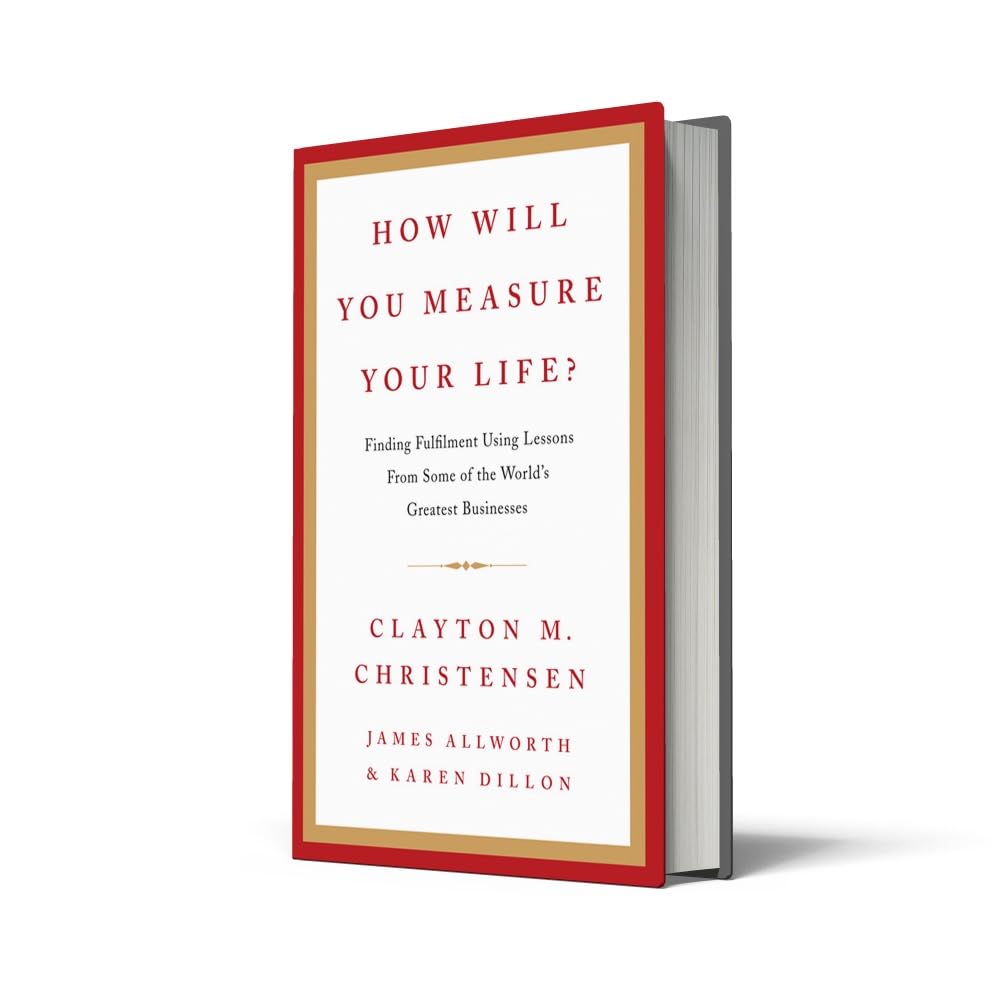Customer Services
Copyright © 2025 Desertcart Holdings Limited



How Will You Measure Your Life?
R**M
Informative
Full of strategies and real life examples from big companies
P**I
Fantastic
Delivered on time and great book
S**H
Great Read
Don't think much. Just buy!!One life changing book for sure.
L**O
Este livro é simplemente incrível!
O autor escreve muito bem, de uma forma clara e de fácil leitura. O que mais gostei foi os exemplos do mundo de negócios e as analogias para a vida pessoal. Certas coisas são óbvias para o mundo corporativo mas não nos atentamos a elas na esfera pessoal. Super recomendo a autoreflexão e os insights de negócio gerados em paralelo!
J**I
Interessante
Un libro tutto sommato interessante che può dare degli spunti interessanti, alcune in realtà sono delle banalità classiche americane con quel approccio davvero molto USA che ci può sembrare come una via di mezzo tra prenderti per il culo o essere fin troppo entusiasta. Ma altre idee sono cmq godibili e praticabili e mi ha aiutato a riflettere sotto un punto di vista differente.
A**V
Contenido
Este producto se emparte en los programas de desarrollo de dirección en nuestra escuela de negócios, AESE Business School - Portugal (Una visión critiana de de la sociedad y el negocio). Universidad de Navarra
J**N
I Shoulda Coulda Read This 8 Years Ago!
While locked down here in my bunker during this COVID-19 era, we’ve been talking about writing another book. No title yet, but here’s the big idea—“If I’d Only Read This Book EARLIER in My Career, I Could Have Avoided This BIG Leadership Mistake!”But should I write about my Top-10, Top-50, or Top-100 big leadership mistakes? (Yikes. I have an abundance of examples.) Much too late, I’ve often read a book that would have given me greater clarity—and sooner.Today’s book would certainly be on the list. Had I read this book in 2013, I would have given much better counsel to younger (and some older) leaders over the last eight years. I would have given less advice and simply said, “Just read this book!”LOL! On Jan. 15, 2013, a talented leader and lifelong learner/leader, Chasz, emailed me and urged me to read this book.GOOD NEWS. I immediately ordered the book back in 2013 (as Chasz instructed!).BAD NEWS. I set this gem aside and didn’t read it until this year during lockdown. Yikes. I wasted eight years! (Sorry, Chasz!)GOOD NEWS. I still have the two-page email from Chasz—and, yes, he was right. This “New York Times” bestseller is amazing. I can’t stop talking about it. And gratefully, Chasz’s 2013 email included his review!Note: On Jan. 24, 2020, an obituary in “The Wall Street Journal” reported that Clayton Christensen had died the day before. He had leukemia. They noted that Christensen was “a Harvard Business School professor and management guru…an authority on what he called disruptive technologies who became more widely known for offering his life as a case study.”So here’s a summary of “How Will You Measure Your Life?” (with notes from Chasz). In the book and in his MBA classes, Christensen asked three big questions:“How can I be sure that...1) I will be successful and happy in my career?2) My relationships with my spouse, my children, and my extended family and close friends becomes an enduring source of happiness?3) I live a life of integrity—and stay out of jail?”On the last day of class each year, Prof. Christensen discussed these three questions with his Harvard Business School students. Word got around and he was then invited to give the talk to the entire study body at the 2010 graduation ceremonies. Next, Karen Dillon, then editor of “Harvard Business Review,” asked him to write the article, “How Will You Measure Your Life?” for HBR. The book was released in 2012 (and yes, I finally read it in 2020!).Chasz notes that when Christensen, also a HBS grad, attended his own class reunions—it concerned him that some classmates were experiencing personal and/or work traumas. Some stopped attending reunions out of embarrassment.I appreciate bullet point book reviews and Chasz didn’t disappoint in his 2013 email to me. He wrote:• We often find our life’s direction by following an “emergent” path. We make our plans and start out in what we believe is the way to go, but to be successful (like most businesses) we deviate from the plan to the opportunity. Christensen’s career aim was to be the editor of “The Wall Street Journal!” But he ended up as a prof at Harvard Business School. (And perhaps he had greater influence there. See two more books below.)• Integrity is holding the line on key commitments. Many people who cross the line naively think they will only cross it once, and will step over and come back “just this time.” But then having crossed that line (which was once a monumental decision), further line-crossing seems insignificant—and each subsequent “small” infraction eventually erodes a person’s integrity—compounding into major losses (family, career, etc.).• Read why Christensen says, “100 Percent of the Time Is Easier Than 98 Percent of the Time.”• Must-read: Christensen’s insights on why “outsourcing” may undermine your family’s values (and your organization’s values)—and why you must keep certain competencies in-house, even if difficult.• You must pursue your life purpose by determining what it is you are going to reflect in your character (whose image will be seen in you?), then commit to what it will take for this to happen, and create a means to track how you are doing in becoming more like your desired image.Chasz suggested that this would be a great CEO book study—especially for young leaders. Interestingly, Christensen himself didn’t sense that his last-day-of-class talks to MBA students were getting much traction—until he announced he had been diagnosed with the same cancer that had taken his father. Then students engaged—and this book is the result.Christensen quotes C.S. Lewis: “The safest road to Hell is the gradual one—the gentle slope, soft underfoot, without sudden turnings, without milestones, without signposts.”In addition to the powerful life lessons (poke-in-rib quotes on mistake-mistaking), every leader and manager will find delightful sidebars and rabbit trails on growing people and businesses in complex environments.Example: Noting “the problem with principal-agent, or incentives, theory…” (why some managers still think money motivates), Christensen discusses Frederick Herzberg’s work on the psychology of motivation—another topic I wish I had known about years ago. Read “One More Time: How Do You Motivate Employees?” in the January 2003 issue of “HBR.” (In the book, Christensen also gives a nice compliment to nonprofit managers.)Picture this on your business card! Clayton Christensen was twice “Ranked #1 in the Thinkers50,” the global ranking of business leaders. He was inducted into the Thinkers50 Hall of Fame in 2019. You’ll appreciate his wisdom throughout the book. He writes, “There are no quick fixes for the fundamental problems of life. But I can offer you tools that I’ll call theories in this book, which will help you make good choices, appropriate to the circumstances of your life.”Christensen writes that instead of telling Intel’s Andy Grove what to think during a consultation, “I taught him how to think. He then reached a bold decision about what to do, on his own.”The co-authors add richness to this remarkable book. In the Acknowledgments section (who reads that?) I got teary-eyed reading the warmth expressed between the three authors (pages 207-221). James Allworth writes to Christensen, “Short of my parents, you have done more to change the way I think about the world than anyone.”After meeting Christensen and learning about his three questions, co-author Karen Dillon recalls, “I stood in the parking lot of HBS a few hours later and knew I didn’t like my answers to those questions. Since then, I have changed almost everything about my life with the goal of refocusing around my family.”Trust us—you will not stop talking about this book and it will cost you! I just ordered another copy for a younger leader today.
Trustpilot
2 months ago
3 weeks ago
1 week ago
2 months ago